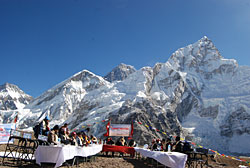 ANANDA RAM DANGOL |
Later today in Copenhagen, a large gathering of eminent mountaineers from around the world will be marching in a 'Summit of Summiteers' campaign to the save the Himalaya. Their message will be reinforced by Prime Minister Madhav Kumar Nepal next week when he addresses world leaders at the climate change summit.
Besides pleading for more foreign aid citing our Least Developed Country status, what can Nepal actually offer its people, and humanity at large, as its unique contribution to turn the threat of global warming into an opportunity to build a better future?
I suggest a 10-point action plan to build a carbon-neutral Nepal:
1. Declare Nepal's aspiration to become a carbon-neutral country by 2030: currently Nepal consumes a tiny amount of energy per capita and has a very small carbon footprint. If we make a concerted and determined effort now, it is quite conceivable that we can build a carbon-neutral future.
2. Develop a master plan for energy independence: at a time when we have prolonged daily blackouts and rely heavily on expensive imported petroleum products for most of our modern transport and industry, energy independence may seem an unrealistic prospect. But Nepal has vast untapped water, solar and wind energy resources, and people power. We certainly have the potential to become energy independent if we develop an ambitious, long-term master plan.
3. Switch to Nepal-based renewable energy sources for major new transport and industrial projects: as we develop ambitious new national reconstruction and development plans, we must discontinue business-as-usual development paradigms. Instead of building new roads and highways that depend on expensive imported petroleum products and destroy our pristine environment, we must switch to electricity-operated high-speed trains, trams, trolley buses and ropeways. Let us discourage smoke-belching, polluting industries and encourage factories and industries that use electric, solar and wind energy to power our industrial plants.
4. Offer generous tax incentives for vehicles and machinery using non-polluting energy sources: although we pay lip service to clean energy, our tax system does not favour the import and use of electrically operated or hybrid vehicles and industrial equipment and machinery. It is time not just for tax incentives, but also for subsidies for transport vehicles and industrial machinery that minimise carbon emissions and greenhouse gases.
5. Launch a global campaign to save the Himalaya: we are lucky to have thousands of mountaineers all over the world who love Nepal and who would happily work with us in a global campaign to save the Himalaya. Let us reach out to them, and organise a campaign of global solidarity with them to help protect the Himalaya and uplift the living conditions of the people of the Himalayan region.
6. Further expand community forestry and national parks: Nepal has a very successful and exemplary community forestry program. We can expand these and our national parks to both provide livelihoods for our people and to earn credit under the global carbon emission-trading scheme.
7. Promote eco-tourism: given the great diversity of its flora and fauna and the stunning natural beauty of Nepal, there is great potential for us to specialise in eco-tourism.
8. Build a new capital city and regional growth hubs: Kathmandu is choking and can no longer handle further population growth and traffic. We need to consider developing a new parallel capital city. As Nepal moves towards a new federal structure, we must develop new, well-planned, environmentally friendly and economically viable urban settlements and growth centres.
9. Promote a culture of non-violence: we must end the culture of violence spreading across the country. Non-violence must extend to protecting our precious natural resources.
10. Invest in children: we must protect our environment to save our children, and empower our children to save the environment. It is for our children and future generations that we must build a carbon-neutral new Nepal. Like all progressive and prosperous countries, let us invest heavily in the survival, protection and development of our children, and inculcate in them an abiding love of nature and the environment.
READ ALSO:
Climate ironies - EAST WEST with Kunda Dixit, 04 DEC 2009
Dateline Everest - FROM ISSUE #479 (04 DEC 2009 - 10 DEC 2009)
Defrosted - FROM ISSUE #479 (04 DEC 2009 - 10 DEC 2009)



